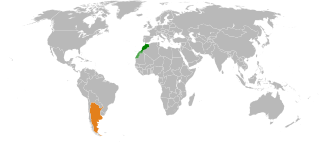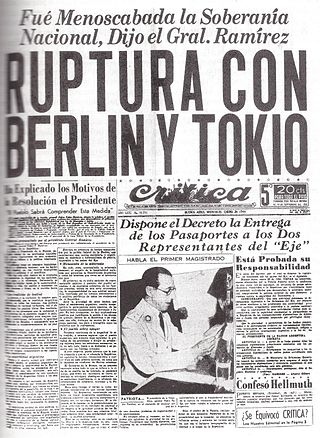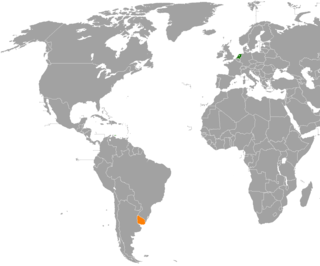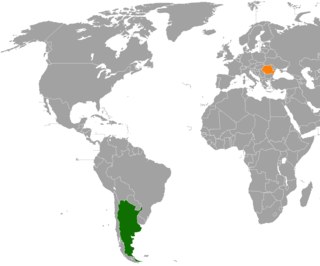
This article deals with the diplomatic affairs, foreign policy and international relations of the Argentine Republic. At the political level, these matters are handled by the Ministry of Foreign Affairs, also known as the Cancillería, which answers to the President. The current Minister of Foreign Affairs, since December 2023, is Chancellor Diana Mondino.

The current and historical relations between the Argentine Republic and the Republic of South Africa, for over a century. Both nations are members of the Cairns Group, G20, Group of 77 and the United Nations.

Foreign relations between Argentina and France, have existed nearly a century. Both states are members of the G-20.

Foreign relations between Argentina and Germany have existed over a century. The free city-state of Hamburg was the first German state to establish diplomatic relations with Argentina in 1829. The first ambassador of Germany to Argentina was sent on 7 May 1871.

Diplomatic relations have existed between the Argentina and the Austria for decades. Both nations are members of the United Nations.

Argentine-Swedish are foreign relations between Argentina and Sweden. Both countries established diplomatic relations on January 3, 1846. Argentina has an embassy in Stockholm. Sweden has an embassy in Buenos Aires and 3 honorary consulates ; the ambassador is also concurrent to Uruguay and Paraguay.

Foreign relations between the Argentine Republic and the Kingdom of Morocco, have existed for over half a century. Both countries are full members of the Group of 77.

Relations between Argentina and Israel began shortly after the Israeli Declaration of Independence in 1948, with the countries establishing diplomatic relations on 31 May 1949.

The history of Argentina during World War II was a complex period that began in 1939, after the outbreak of the war in Europe, and ended in 1945 with the surrender of the Empire of Japan.

Diplomatic relations between India and Paraguay were established in 1961.

The Netherlands is accredited to Uruguay from its embassy in Buenos Aires, Argentina, and honorary consulate in Montevideo. Uruguay has an embassy in The Hague.

The Embassy of the United Kingdom in Buenos Aires is the chief diplomatic mission of the United Kingdom in Argentina. The embassy also represents the British Overseas Territories in Argentina.
Antisemitism is the practice of showing hostility toward or discrimination against Jews as a religious, ethnic, or racial group. In Argentina antisemitism has been around since Spanish colonization in the sixteenth century, and has continued to the present day. In the twentieth century antisemitism in Argentina was particularly pervasive, especially in the World War II and post-World War II eras. In these eras Argentine antisemitism adopted Nazi antisemitism, and blended it with religious (Catholic) hostility, which allowed vehement antisemitism in Argentina to persist well into the 1970s and 1980s.

Diplomatic relations between the Argentine Republic and Romania, have existed for over a century. Both nations are members of the United Nations.

The Embassy of the Philippines in Buenos Aires is the diplomatic mission of the Republic of the Philippines to the Argentine Republic. First opened in 1949 as the first Philippine diplomatic mission in Latin America, it is currently located in the barrio of Palermo in northern Buenos Aires, near its Chinatown.


















